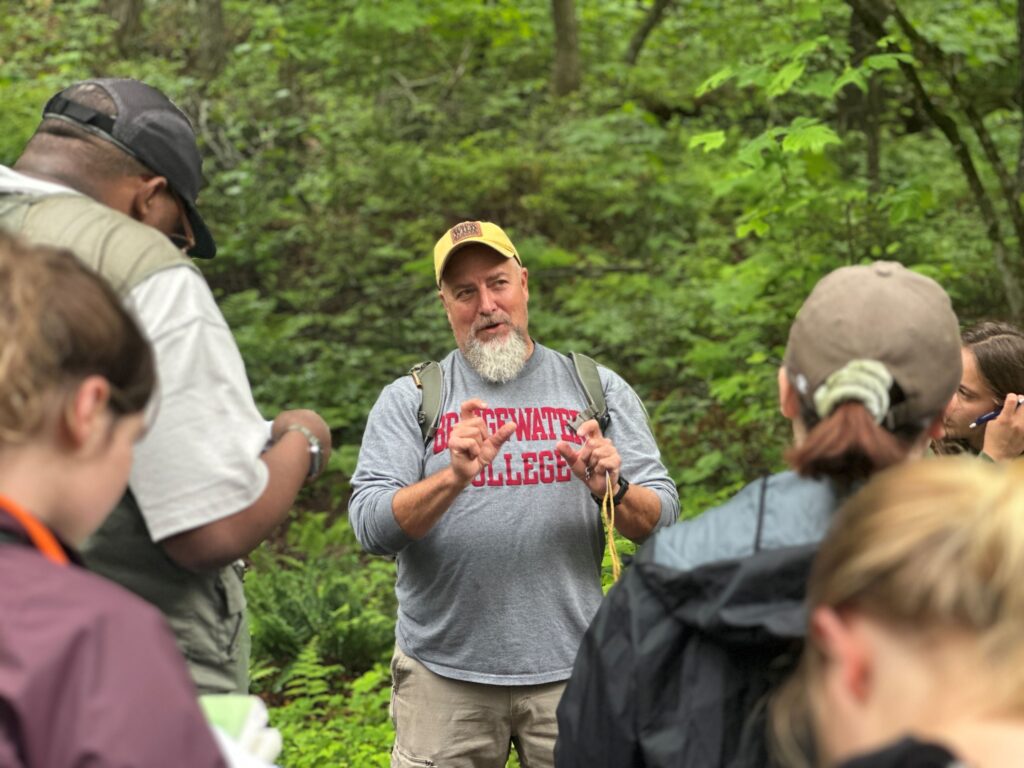Twenty-some students and their professor pile into two Bridgewater College vans at 8 a.m. on a May Wednesday and head west. After a 30-minute drive up Rt. 33 into the Allegheny Mountains, and a 15-minute drive down a bumpy dirt-and-gravel one-lane road into woods of white pine and hemlock, the vans stop at a small pull-off area and the passengers disembark into the cool and misty morning air.
We have arrived at Switzer Lake, the main reservoir providing water for Rockingham County, located not far from West Virginia in the George Washington National Forest. While the area surrounding the lake is known for its woodland birds and waterfowl—great blue herons, pileated woodpeckers and bald eagles—today we are here in search of the area’s plant life.
Every other year Dr. Ed Lickey, Associate Professor of Biology, takes students into the mountains and forests surrounding Bridgewater to observe, collect and identify the region’s flora. His May Term course, Field Botany, is popular with biology and environmental science majors as well as students majoring in other fields who are curious to learn more about their local environment.
One such student trekking through the woods on this summer morning is Lauren Henderson, a rising senior from Winchester, Va. Henderson is majoring in art, with plans to pursue a career in conservation photography. She has already done some marketing work for the Shenandoah Valley Conservancy, a non-profit land trust based in Harrisonburg, Va., and says she hopes what she is learning will help her be a better photographer.
“I need to know what I’m photographing,” she says as she takes a cutting of a nearby tulip poplar and points out the neon orange coloring at the base of the tree’s yellow flower.
Her classmate Keely Patton is a rising senior and first-generation college student who came to BC from Virginia Beach, Va., with dreams of becoming a marine biologist. After taking a few classes with Lickey and spending time in the mountains, Patton changed her major to environmental science and says she now hopes to pursue a career as a conservation biologist.
“I found a love for the mountains. Now I want to do work in conservation and with habitats,” Patton says, adding that she particularly enjoys the hands-on aspect of the Field Botany class. “It is a lot better to be outside than just reading about it.”
Today the students are tasked with collecting plants to take back to the laboratory to dry, press and identify for their final projects. Dara Showalter, a rising senior biology major from Harrisonburg, Va., spies what she thinks is either a rhododendron or mountain laurel plant on a rise above the road. She leads this writer up the rocky embankment, holding onto tree branches and slipping in the mud, to take a closer look. Showalter says that she took Field Botany mostly out of personal interest. She hopes to go to graduate school for physical therapy after she completes her degree at BC.
“I knew nothing about plants and wanted to learn how to look at them,” Showalter says. “I have a much deeper appreciation of plants now. And I get credit for being out in the woods.”
Showalter takes a closer look at the light pink flowers on the shrub, pointing out where the five petals are fused around a spotted center. She pages through the class textbook, B.E. Wofford’s Guide to the Vascular Plants of the Blue Ridge, and matches the characteristics of the plant to the appropriate family and species.
“Mountain laurel,” she declares, confidently.
As we make our way back down to join the rest of the class, Showalter says that one of the best parts of Field Botany has been the professor and his knowledge and interest in the subject. That sentiment is echoed by Nate Herrman, a senior environmental science major from Madison, Va.
“Dr. Lickey is one of my favorite professors,” Herrman says. “He is so passionate about what he teaches.”
They are not alone in that opinion; Lickey, who has taught at BC since 2007, was the recipient of the Ben and Janice Wade Outstanding Teaching Award earlier this spring. In addition to teaching biology, botany and biogeography—a subject that examines the geographical distribution of plants and animals—Lickey also serves as curator/manager of the BC herbarium and greenhouse. He says that Field Botany is one of his favorite classes to teach, and he particularly enjoys getting students out to experience the natural world not far from the BC campus.
– Heather S. Cole
5/29/25


